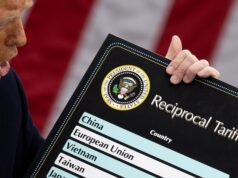As we look toward Thanksgiving and Christmas, I realize that 2025 is quickly coming to an end, and so is the Jubilee Year of Hope. What will be our take-aways from this special time of grace?
Hope has become more real for me this year thanks to a certain definition I could really lean into: “For a Christian, to hope means the certainty of being on a journey with Christ toward the Father who awaits us,” Pope Francis once said during a general audience.
“Hope is never still; hope is always journeying and it makes us journey.”
In his encyclical Spe Salvi, Pope Benedict XVI defined hope in a similar way with a quote from St. Josephine Bakhita, a former Sudanese slave: “I am definitively loved and whatever happens to me – I am awaited by this Love. And so, my life is good.”

Benedict elaborated, “We see as a distinguishing mark of Christians the fact that they have a future: it is not that they know the details of what awaits them but they know in general terms that their life will not end in emptiness. Only when the future is certain as a positive reality does it become possible to live the present as well.”
Finally, this famous line from Pope Benedict XVI is one that often comes to mind: “The one who has hope lives differently; the one who hopes has been granted the gift of a new life.”
And so, as the close of this Jubilee Year draws near, let us ask ourselves how we will live differently thanks to hope.
How will we live our lives more fully in the present, while also looking forward in hope to the certain future that awaits us?
One of this year’s defining moments for me was a talk given by a young religious sister to a group of teens and young women at a discernment event this summer.
She suggested that we employ two interrelated practices to prepare the soil of our souls to receive the gift of hope. They are memory and gratitude.
She suggested that we make a list of 15 or so extraordinary moments in our lives and that we read through them on a regular basis to bring to mind the presence of God on our journey and to express our gratitude to him.
Through gratitude, she said, we fix our gaze on God; we see him at work in our lives, creating for us a positive reality and a certain future.
Each of us has a number of these extraordinary events in our lives – when Jesus became real to us in a personal way, when he showed us our vocation, or changed us in some way, when the Lord visited us at a difficult time.

Pope Francis also encouraged the faithful to think back on such moments of inspiration and to relive them in order to find strength and to be able to continue moving forward, even when the journey is difficult.
“Christian memory is the salt of life,” he said.
There are a number of passages from Scripture that can help us to remember and give thanks.
Psalm 103 invites us, “Bless the Lord my soul, and do not forget all his gifts …;” and Psalm 136 repeatedly evokes the everlasting mercy of God.
We can make both psalms our own as we incorporate our experiences into the texts.
An uplifting passage from the prophet Isaiah (63:7 ff) may serve as an introduction to our own prayers of gratitude: “The loving deeds of the LORD I will recall, the glorious acts of the LORD, because of all the LORD has done for us, the immense goodness to the house of Israel which he has granted according to his mercy and his many loving deeds.”
But my favorite Scripture passage for remembering and expressing gratitude is Mary’s Magnificat (Luke 1:46-55), in which Our Lady recalls the amazing things God has done for her and her people. May each of us be able to say, “The Almighty has done great things for me and holy is his name!”
As you prepare for Thanksgiving this year, take time to remember and give thanks for God’s loving presence in your life. Encourage those with whom you gather to do the same.
And may you take hold of hope in a future of unending life with God!
Sister Constance Veit is the communications director for the Little Sisters of the Poor in the United States and an occupational therapist.












